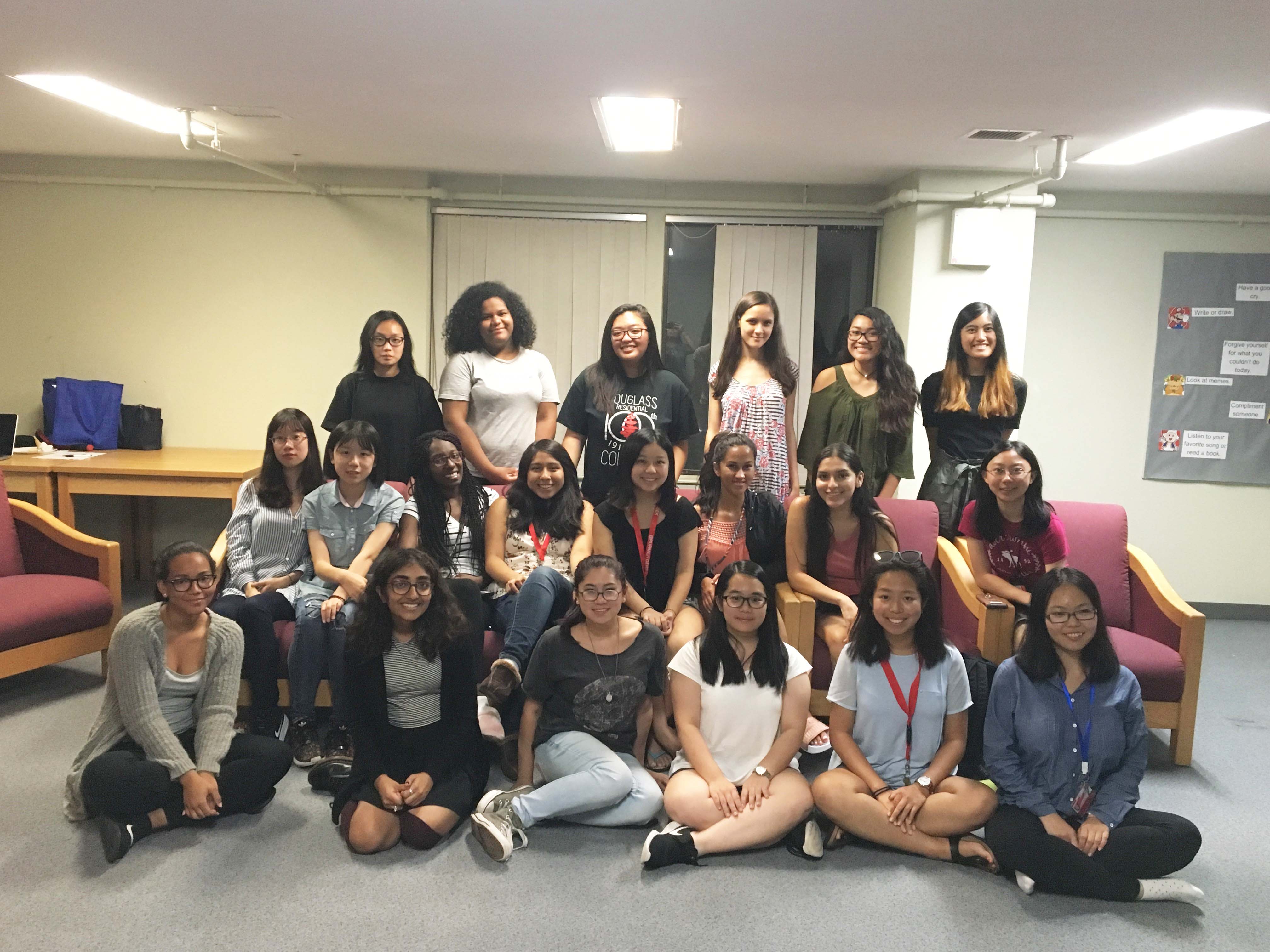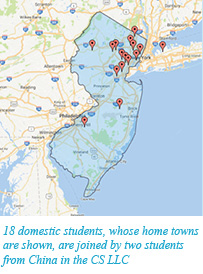September 2017
DIMACS joins the Douglass Residential College, School of Arts and Sciences, and Department of Computer Science in welcoming the second cohort of students to the Douglass-SAS-DIMACS Computer Science Living-Learning Community for Women, or CS LLC for short. The incoming CS LLC class consists of 20 first-year women who elected to join the LLC. Among them are 17 students from around NJ, one student from NY state, and two students from China.
 The CS LLC is an immersive educational experience aiming to enhance the recruitment and retention of women in CS. Students in the CS LLC live together as a community associated with Douglass Residential College (DRC). To our knowledge, it is the first living-learning community devoted exclusively to women in computer science.
The CS LLC is an immersive educational experience aiming to enhance the recruitment and retention of women in CS. Students in the CS LLC live together as a community associated with Douglass Residential College (DRC). To our knowledge, it is the first living-learning community devoted exclusively to women in computer science.
The new group of CS LLC students arrived on campus on August 31, a few days before the start of classes, and was welcomed by CS LLC Director Cynthia Sanchez Gomez. In the days before classes began, students learned their way around campus, met their new CS LLC classmates, their faculty advisor (and DIMACS Director) Rebecca Wright, their peer academic leader, and their graduate student mentor. They also participated in Douglass Welcome Days which included activities such as DRC Convocation, an overview of the Douglass Experience and Mission course, and Dean’s Dessert at the Dean’s Residence. Sanchez Gomez says, “We are very excited to welcome our second cohort of women in the Douglass-SAS-DIMACS Computer Science Living-Learning Community! These women have already started sharing moments that bring them together as a community. Our goal is to provide a platform for them to explore common interests and support each other in their journey to become computer scientists.”
 During the academic year, key elements of the CS LLC include mentoring, peer support, a seminar course exposing students to the issues and applications of CS, as well as a wide range of organized social, academic, and outreach activities. Students live together as part of the CS LLC for their entire freshman year, during which time most will complete the first two courses that are core to the CS major – CS111 (Introduction to Programming) and CS112 (Data Structures). Between these two courses, studies find a disproportionate drop in participation by women in CS and a widening of the gender gap. A recent study conducted by Monica Babes-Vroman and co-authors in the CS department analyzed three years of academic and survey data from students in CS111, CS112, and other courses at Rutgers. The results showed that female participation decreased from 23% in CS111 to 17% in CS112. One goal of the CS LLC is to create a community that provides peer support and academic resources to strengthen the progression from CS111 to CS112 and lays the foundation for future success in the major. Thu Nguyen, CS department Chair and a co-author of the study, interacted with the CS LLC’s first cohort through office hours and final exam study sessions. He noted that the CS LLC seems to foster community building, “It was obvious that the young women were developing strong relationships through the LLC. I believe and hope that these relationships will last throughout (and beyond) their stay at Rutgers, providing an important support network as they navigate a large major within a large university.”
During the academic year, key elements of the CS LLC include mentoring, peer support, a seminar course exposing students to the issues and applications of CS, as well as a wide range of organized social, academic, and outreach activities. Students live together as part of the CS LLC for their entire freshman year, during which time most will complete the first two courses that are core to the CS major – CS111 (Introduction to Programming) and CS112 (Data Structures). Between these two courses, studies find a disproportionate drop in participation by women in CS and a widening of the gender gap. A recent study conducted by Monica Babes-Vroman and co-authors in the CS department analyzed three years of academic and survey data from students in CS111, CS112, and other courses at Rutgers. The results showed that female participation decreased from 23% in CS111 to 17% in CS112. One goal of the CS LLC is to create a community that provides peer support and academic resources to strengthen the progression from CS111 to CS112 and lays the foundation for future success in the major. Thu Nguyen, CS department Chair and a co-author of the study, interacted with the CS LLC’s first cohort through office hours and final exam study sessions. He noted that the CS LLC seems to foster community building, “It was obvious that the young women were developing strong relationships through the LLC. I believe and hope that these relationships will last throughout (and beyond) their stay at Rutgers, providing an important support network as they navigate a large major within a large university.”
During the spring semester, all CS LLC students take a seminar course entitled “Great Ideas and Applications in Computer Science.” This one-credit seminar course is taught by Rebecca Wright and designed specifically for the CS LLC to ensure that students have a shared classroom experience. It also serves to connect some of the topics the students are learning in their first-year CS courses to exciting applications of CS. The course includes high-level discussion of examples demonstrating how CS can have a positive impact on a wide variety of applications including those in advanced science, engineering, medicine, journalism and politics, commerce, and more. The course also uses a few more detailed examples to highlight how underlying computational ideas such as abstraction, algorithms, large-scale data processing play a role in these applications, as well as how programming is the enabler that turns these ideas into working systems.
The CS LLC is available as a housing option to newly admitted students who join Douglass Residential College and intend to major in computer science. It is a collaboration of Douglass Residential College, DIMACS, and the Rutgers School of Arts and Sciences within which the Department of Computer Science resides. It is partially funded by a grant from the National Science Foundation in order to evaluate and understand the impact of the program on women’s engagement and persistence in the computer science major at Rutgers. Data and insights from these studies contribute to the longer-term goal of establishing best-practice approaches to engaging students in CS during their early years in college. Once established and validated, these approaches can then serve as a model that can be replicated at other institutions for nationwide impact.
References:
M. Babes-Vroman, I. Juniewicz, B. Lucarelli, N. Fox, G. Halderman, A. Mehta, R. Chokshi, T. D. Nguyen, and A. Tjang, “Exploring Gender Diversity in CS at a Large Public R1 Research University,” Proceedings of the 2017 ACM SIGCSE Technical Symposium on Computer Science Education, March 2017.
Printable version of this story: [ PDF]


